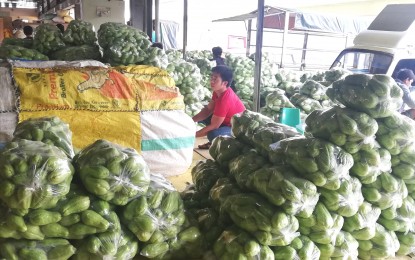
STEADY SUPPLY. The Department of Agriculture in the Cordillera Administrative Region (DA-CAR) said there is a steady supply of highland vegetables, with an average of 2.3 million kilograms of assorted commodities traded from Jan. 2 to Feb. 14, 2024. Danilo Daguio, DA-CAR regional technical director for operations, said the agency continues to monitor the situation on the ground and has not received any report of drought situations affecting any of the highland commodities. (PNA file photo)
LA TRINIDAD, Benguet – The supply of highland vegetables remains stable without any showing of an eminent drop in production despite the dry spell, an official of the Department of Agriculture-Cordillera Administrative Region (DA-CAR) said Wednesday.
“So far, we have not monitored any vegetables that are affected by El Niño,“ Danilo Daguio, DAR regional technical director for operations, told the Philippine News Agency in Filipino on Wednesday, adding that “I don’t think we will have shortage.”
Among the vegetables needed for cooking chopsuey, a stir-fried vegetable dish, are cabbage, carrots, bell pepper, chayote, cauliflower, baby corn and chicaro.
Based on DA-CAR’s average daily monitoring of traded commodities, a total of 2,290 metric tons of assorted vegetables were traded on Wednesday alone and transported to different markets in the country.
The regional office has reported an average of 2,000 metric tons of assorted vegetables traded at the different trading facilities in La Trinidad, Benguet and delivered to the different markets in the country.
Daguio, however, said they are closely watching rice and corn plants.
He said that with the El Niño Task Force actively meeting even before the onset of the dry spell in the last quarter of 2023, the different agencies have put in place mitigating measures, assistance and interventions in case a major effect to the products are monitored.
Daguio said the DA is closely working with the National Irrigation Authority (NIA) to keep a close eye on the tail end of the irrigation systems, especially in vulnerable areas and the rain-fed plantation sites.
The Philippine Atmospheric, Geophysical and Astronomical Services Administration (PAGASA)-Baguio, in a report to the region’s El Niño Task Force, earlier said Abra, Ifugao, Benguet, Kalinga, Apayao and Mountain Province were already experiencing dry spell situation since last month.
A dry spell situation is characterized by below-normal rainfall conditions for three consecutive months, while a drought is characterized by a rainfall condition below normal for five consecutive months or the reduction in the rainfall is about 41 to 80 percent compared to the normal rainfall data of a particular month.
The Cordillera region produces at least 85 percent of the country’s supply of temperate vegetables, with Benguet province producing at least 65 percent of the region's production. (PNA)
